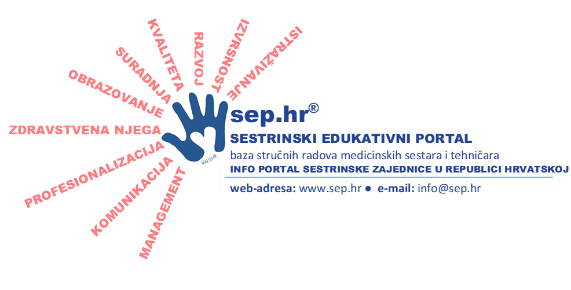Asja Jaklič
University Medical Centre Ljubljana - Slovenia, Department of Infectious diseases and Febrile Illnesses, Intensive Care Unit
ventilator – associated pneumonia (VAP), prevention, nursing care
''2. Međunarodni kongres HDMSARIST-a''
Šibenik, 23.-26. travnja 2009. godine
Hospital acquired infections are infections associated with diagnostics, treatment, medical care and
rehabilitation in a hospital or other health institution.
Ventilator associated pneumoniae (VAP) in infection of lower airways, initiated after 48 hours of intubation.
VAP is the most frequent complication in patients admitted to ICU. VAP prolongs mechanical ventilation,
which increases mortality, morbidity and costs. Infection prevention is considered a priority in the ICU and
an important indicator of quality care. Nurses need to understand the aetiology of VAP, risk factors for this
type of pneumoniae, strategies and preventive measures to prevent of VAP.
The risk factors for developing VAP are colonisation or contaminations of equipment and accessories,
gastric bacterial overgrowth, aspiration of oral and gastric contents, impaired mucociliary clearance,
colonisation of tracheal tube biofolm and enteral tube. Other important risk factors are previous pulmonary
disease of a patient, burns, neurosurgical conditions and reintubation of a patient.
The article describes strategies for prevention of VAP: patients positioning, oral care, hand hygiene,
aspiration of subglottic secretions, ventilator circuit and other respiratory equipment management, method of
enteral feeding , saline lavage, type of endotracheal suctioning system (open vs closed). The article also
descibes non-invasive mechanical ventilation which is used to support patients with various forms of acute
respiratory failure . NIV is less invasive for patient with less complications, espec ially respiratory infections.
Critical care nurses need to understand the factors which place their patients at risk of development VAP
and use of evidence – based strategies to prevent VAP, because over- crowded departments of ICU,
insufficient number of medical staff, over – laboured medical staff and under-educated medical staff are also
very important risk factors for nosocomial infections and transfer of micro – organisms within hospitals.
